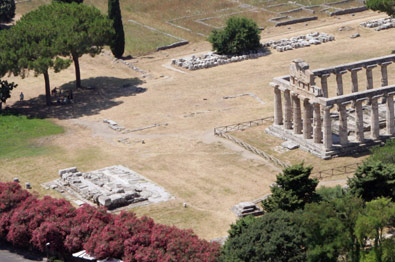![Veduta aerea dei templi di Paestum [ click to enlarge ]](../images/foto/paestum_templi_aerea.jpg) The city of Paestum was founded around in the seventh century BC By settlers from Sybaris Greeks with the name of Poseidonia. The city of Paestum was founded around in the seventh century BC By settlers from Sybaris Greeks with the name of Poseidonia.
The richness of the city is documented by the construction occurred between the sixth and fifth centuries BC Large temples whose ruins were well preserved up to the present day (2007).
In 400 approx. BC The Lucani, italic people log Sabellico, conquered the city and gave it the name of Paistom. In 273 BC Roman colony became law with the Latin name of Paestum after the city had parteggiato for the loser, Pirro, in the war against Rome in the early third century BC.
The city remained under Roman domination, but started to come into decline between the fourth and seventh centuries, probably because of changes in the drainage leading all'impaludamento and contemporary arrival in Europe of malaria. After the devastation brought by the Saracens in the ninth century and by the Normans in, the site was abandoned during the Middle Ages, when the inhabitants, allontanatisi, founded Capaccio.
![Veduta aerea dei templi di Paestum [ click to enlarge ]](../images/foto/paestum_tempio.jpg) Paestum still important architectural monuments of Greek and Roman times. Paestum still important architectural monuments of Greek and Roman times.
Especially important are the three major temples, two of Doric order, and an order of Doric and Ionic, which constitute some of the best examples of these styles.
The first Temple of Hera, the so-called Basilica (ca. 540 BC), was one of the largest Greek temples built in stone.
The oldest of the three, bears the marks of his arcaicità in some structural peculiarities, for example in peristasi enneastila (column 9) on the short side.
The Temple of Athena (ca. 500 BC), formerly known as the Temple of Ceres, is smaller, but more balanced in forms.
The Temple of Poseidon said, but in reality this was dedicated to, shows the mature forms of the Temple of Zeus in Olympia.
Besides the temples are preserved remains of the ancient Roman city with sye its roads and homes, as well as a small amphitheatre.
Several findings of considerable interest can be seen in the museum set up near the archaeological.
|

